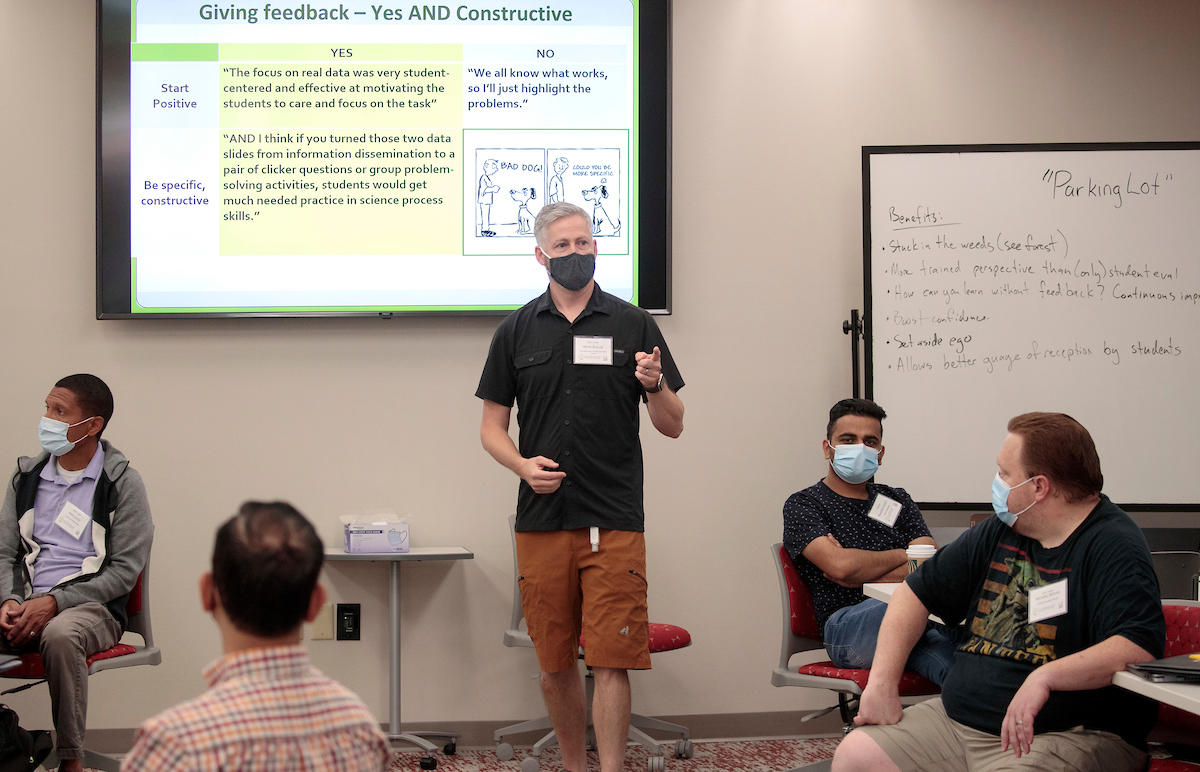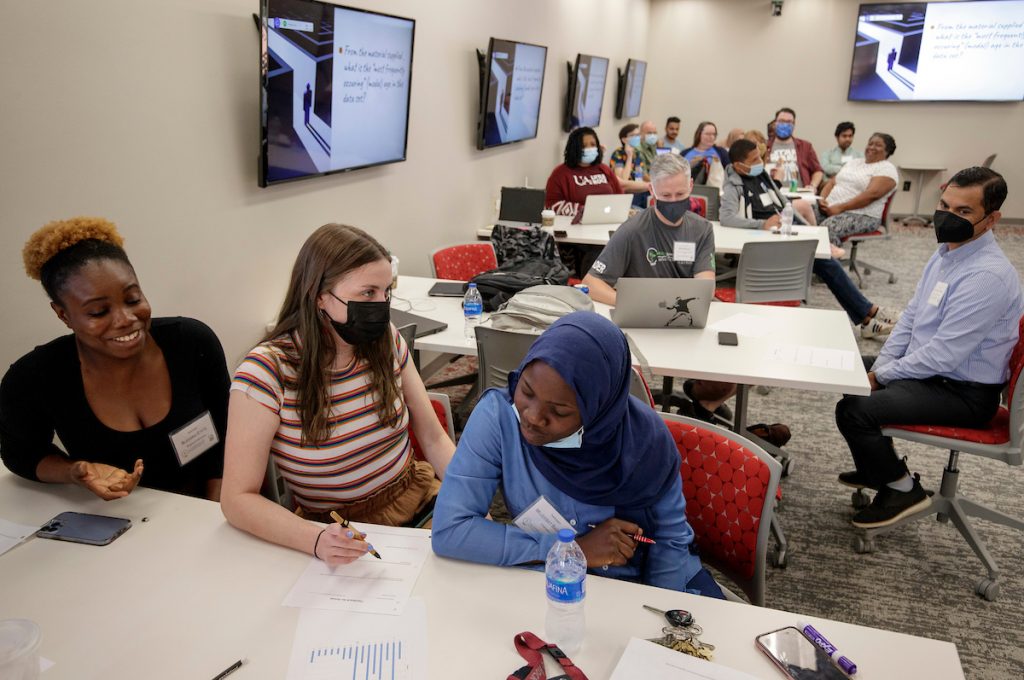UA Little Rock Faculty, Graduate Students Learn Important Teaching Skills at Mobile Institute on Scientific Teaching

More than 25 UA Little Rock faculty members and graduate students learned valuable teaching skills in active learning through the 2022 Mobile Institute on Scientific Teaching (MIST).
The MIST workshop provides a focus on active learning because studies show that students are 1 ½ times more likely to pass classes in active learning classrooms compared to students in classes that use traditional lecturing only.
Since UA Little Rock began offering the MIST workshops in 2019, they have trained more than 100 people including 84 faculty members and 18 graduate teaching assistants. Mark Baillie, assistant professor of chemistry, is part of a national MIST leadership group and has run MIST workshops at 10 locations around the world.
“We are trying to fill a gap of teachers who have never been trained to teach like this, and we are training the next generation of faculty,” Baillie said. “This workshop forces participants to think about their students with a student-success mindset.”
This is the first year the MIST workshop has been open to graduate students. Since many graduate students teach their first classes as teaching assistants, the workshop will teach future faculty members essential pedagogy skills at the beginning of their teaching careers.
“I was excited to take this workshop in order to have more knowledge and research on scientific teaching, improve my communication and dissemination of vital information to students, and learn more about student engagement and how to make my class more inclusive to help facilitate learning,” said Mujeebat Bashiru, graduate student in chemistry. “The workshop was a great way to learn to relate with a diverse group of people, faculty, and graduate students from various fields on campus. I’m hopeful that implementing what I have learned in this workshop will benefit the students greatly.”
Participants had a hands-on experience on the impact of evidence-based teaching approaches such as active learning and inclusive teaching practices, with deliberate practice and backward design. This workshop has been identified as a major transformative event in the career of many college faculty, from R1 institutions to community colleges.
“As a leader, I train people on different types of assessment to do in their classrooms,” said Michael Moore, learning assistant program coordinator and a MIST learning facilitator. “It’s important for teachers to gather evidence and use that as feedback in their classes to improve teaching. A big role of a leader [in the MIST workshop] is trying to help people see that there are many different people who are interested in teaching, we all have our strengths and weaknesses, and it’s better to work together to accomplish our teaching goals. I want to develop a community of teaching here at UA Little Rock.”
Neff Lankford, graduate student in instructional design, said she found the workshop to be a very informative and hands-on experience.

UA Little Rock teaching assistants and professors participate in the Mobile Institute on Scientific Teaching workshop. Photos by Ben Krain.
“Right now, we are working on backward design and creating lessons from the course learning outcome,” Lankford said. “We are learning something new and fresh. We’ve gotten so many different perspectives culturally. I’ve transformed my teaching style completely. I want to give students the opportunity to learn and interact with others.”
Noelle Butski, assistant professor of marketing, said she decided to complete MIST for a chance to improve her classroom design and activities
“I feel like it’s my responsibility to my students to be the best person that I can be,” Butski said. “I always look for ways, especially in the summer, to improve my skills. We are learning how to better design our courses in a student-centered way, from how we approach learning objectives to evaluation. I feel grateful that I had the opportunity to take this workshop. I am looking forward to seeing how my courses change and develop over time. I’m excited to see how my students react to some of the changes I make and how it improves my teaching overall.”
This year’s participants, named Scientific Teaching Fellows after completing the workshop, include:
- Blessing Etete, graduate student in physics and astronomy
- Imraul Emmaka, graduate student in computer science
- Joseph Asante, graduate student in bioinformatics
- Karie Sanford, graduate student in chemistry
- Lawrence Smith, associate professor of theatre arts
- Li Poirot, graduate student in chemistry
- Louise Lowe, student success coordinator in Ottenheimer Library
- Marvin Bonney, graduate student in physics and astronomy
- Mavis Forson, graduate student in chemistry
- Md Imran Sarker, graduate student in computer science
- Michael Ugbade, graduate student applied physics
- Miles Blanton, instructor of physics and astronomy
- Mujeebat Bashiru, graduate student in chemistry
- Nawab Ali, professor of biology
- Neff Lankford, graduate student in instructional design
- Noelle Butski, assistant professor of marketing
- Peter Akerele, graduate student in applied sciences
- Qingfang He, professor of biology
- Rajendra Subedi, graduate student in physics
- Saketh Kalam, graduate student in engineering technology
- Samantha Macchi, graduate student in chemistry
- Sarah Clements, instructor of management, marketing, and technology
- Sujan Ghosh, assistant professor of engineering technology
- Syed Abdi, graduate student in systems engineering
- Tahany Rashed, graduate student in physics and astronomy
- Tariq Masood, adjunct instructor in engineering technology
- Uttamasha Oyshi, graduate student in computer science
The workshop’s leadership team also included Sharma Ashok, assistant professor of engineering technology, Laura Ruhl, associate professor of Earth Sciences, Lauren Wilson, assistant director of the Multicultural Center, Lundon Pinneo, assistant professor of education, Markia Herron, instructional designer for e-Learning, Nate Marvin, assistant professor of history, and Kirk Leach, assistant professor of public affairs.
The MIST workshop at UA Little Rock was sponsored by the Office of the Provost and the Graduate School. UA Little Rock is currently the only higher education institution in Arkansas that runs MIST workshops, but Baillie is hoping to expand in the future to other institutions in Arkansas.
“My dream is to have enough people here trained that we could offer to provide these workshops to other institutions” Baillie said. “Providing more training for faculty in the science of how people learn may help create new ways to support all Arkansas across the state.”
